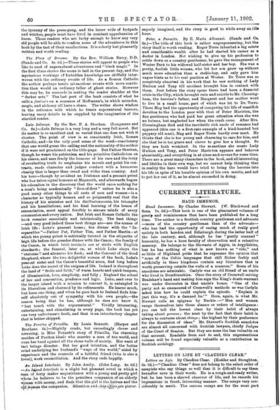C URRENT LITERATURE.
HA.TJD IMMEMOR.
Hata /mmemor. By Charles Stewart. (W. Blackwood and Sons. 7e. 6d.)—This book is one of the pleasantest volumes of gossip and reminiscence that have been published for a long time. The author is a Scottish country gentleman and advocate —more of the country gentleman than of the advocate— who has had the, opportunity of seeing much of really good society in both London and Edinburgh during the latter half of the late century, and, although he has "gently scanned " humanity, he has a keen faculty of observation and a retentive memory. He belongs to the Stewarts of Appin, in Argyllshire, but he has nothing of what is now known as " side," and so little of Highland pride that he expresses the opinion that " none of the Celtic languages that still flicker feebly and artificially in these kingdoms contain any literature that is worth preserving outside the walls of a museum." Some of his anecdotes are admirable. Carlyle was an old friend of an uncle who lived in Dumfriesshire. Once the story of Cromwell seizing Bradshaw's hand and making him sign the King's death-warrant was under discussion in that uncle's house. " One of the party not so enamoured of Cromwell's methods as was Carlyle asked him how he could explain the episode. Explain it just this way, it's a damned lie.'" Here, again, is what Mr. Stewart calls an epigram by Buckle :—" Men and women range themselves into three classes or orders of intelligence : you can tell the lowest class by their habit of always taking about persons ; the next by the fact that their habit is always to converse about things ; the highest by their preference for the discussion of ideas." Mr. Stewart's Scottish anecdotes are almost all concerned with Scottish lawyers, chiefly Judges of the Court of Session. But they are none the less valuable on that account. Readable from end to end, this unpretentious volume will be found especially valuable as a contribution to Scottish sociology.






































 Previous page
Previous page